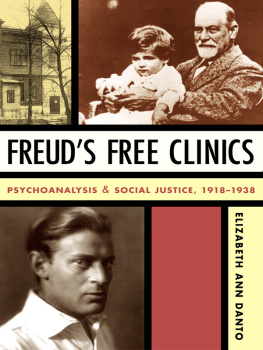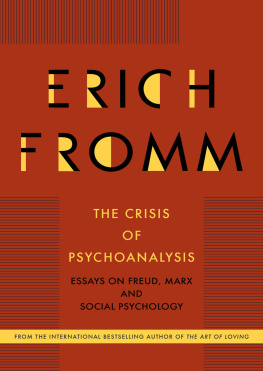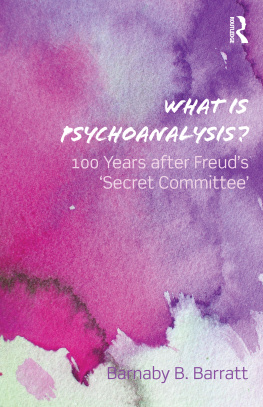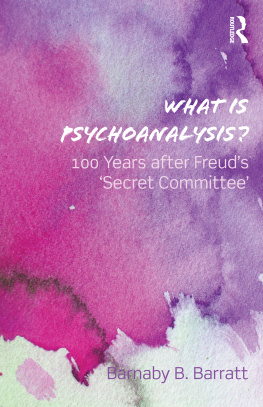FREUDS FREE CLINICS
Freuds Free Clinics
PSYCHOANALYSIS & SOCIAL JUSTICE, 19181938
Elizabeth Ann Danto
We are not the first
Who with best meaning have incurred the worst.
WILLIAM SHAKESPEARE, KING LEAR
COLUMBIA UNIVERSITY PRESS NEW YORK

COLUMBIA UNIVERSITY PRESS
Publishers Since 1893
New York Chichester, West Sussex
cup.columbia.edu
Copyright 2005 Elizabeth Ann Danto
All rights reserved
E-ISBN 978-0-231-50656-4
Library of Congress Cataloging-in-Publication Data Danto, Elizabeth Ann.
Freuds Free Clinics : psychoanalysis and social justice, 19181938 / Elizabeth Ann Danto
p. cm.
Includes bibliographical references and index.
ISBN 0231131801 (alk. paper)
1. PsychoanalysisEuropeHistory20th century. I. Title.
BF173.D365 2005
150.19509409041dc22
2004043141
Casebound editions of Columbia University Press books are printed on permanent and durable acid-free paper.
Designed by Lisa Hamm
A Columbia University Press E-book.
CUP would be pleased to hear about your reading experience with this e-book at .
TO PAUL
CONTENTS
THE PEOPLE and institutions without whom this book would simply not exist, are a large and generous company. I am deeply thankful.
Dean James Blackburn and President Jennifer Raab have imbued the Hunter College School of Social Work with a wonderful energy. They, and the students and faculty, make Hunter and the City University of New York an exceptional place for teaching and writing.
I am honored to have received research support from the TIAA-CREF (2004), the DAAD/German Academic Exchange Service (2002), the Eugene Lang Junior Faculty Development Award at Hunter College (2000), the Hunter College Presidents Teaching and Research Incentive Award (1999), the Rockefeller Archive Center Research Award (1999), and the American Psychoanalytic Association Fellowship for 19981999. I thank Robert Buckley at Hunter College for his brilliant administration of these awards.
Among the archivists and librarians, the bedrock of this book, I want to thank Nellie Thompson and Matthew von Unwerth at the A. A. Brill Archives of the New York Psychoanalytic Society and Institute; Sanford Gifford of the Boston Psychoanalytic Society and Institute for the papers of Helene and Felix Deutsch and Grete and Eduard Bibring; Thomas Rosenbaum of the Rockefeller Archives Center for assistance with documents from the Rockefeller Brothers Fund, the Laura Spellman Rockefeller papers, the Rockefeller Foundation Archives, and the Commonwealth Fund; Rachel Vigneron for assistance with Otto Fenichels Rundbriefe in the Library at Austen Riggs Center, Stockbridge, Massachusetts; Marvin Krantz for access to the Sigmund Freud Archives and the papers of Anna Freud, Siegfried Bernfeld, Otto Fenichel, and Muriel Gardiner in the Manuscript Collections, Library of Congress, Washington DC; Eckhardt Fuchs of the German Historical Institute, Washington DC; Stephen Novak for access to Sigmund Freuds personal library, Library of the College of Physicians and Surgeons, Columbia University; also the Otto Rank papers and transcripts of Oral Histories of the Psychoanalytic Movement by Bluma Swerdloff in the Rare Book and Manuscript Collection, Columbia University Libraries; Jerome Kavka of the Chicago Institute for Psychoanalysis for the papers of Therese Benedek and Franz Alexander; Ellen M. Shea for the Edith Banfield Jackson papers at the Schlesinger Library, Radcliffe Institute for Advanced Study, Harvard University; the New York Historical Society for the NY State Board of Charities records; Mary Boyd Higgins at the Wilhelm Reich Infant Trust; Dianne Spielmann at the Leo Baeck Institute in New York City; the Archives of the Sophia Smith Collection, Smith College School of Social Work, Northampton, Mass.; Lesley Hall for the Melanie Klein papers at the Wellcome Institute for the History of Medicine, London; Riccardo Steiner, Polly Rossdale, and the Committee on Archives at the British Psycho-Analytic Society (London) for the papers of Ernest Jones; Michael Molnar at the Freud Museum in London; Tom Roberts of the Sigmund Freud Copyrights/Paterson Marsh Ltd., UK; Robert Elwall for Ernst Freuds archives, Royal Institute of British Architects, London; Winfried Schultze at the Universittsarchiv of Humboldt University in Berlin; Inge Scholz-Strasser and Christian Huber at the Archives of the Sigmund Freud Foundation, Vienna; Helmut Grger at the Josephineum Institute for the History of Medicine, Vienna; Gregor Pickro at the Bundesarchive in Koblenz, Germany; Johanna Bleker, Thomas Mueller, and Cornelius Borck at the Center for the Humanities and Health Sciences, Institute for the History of Medicine in Berlin; and Philip Swan, Tanya Manvelidze, and Norman Clarius of the Hunter College Libraries. Many of these kind men and women are also historians, psychoanalysts, social workers, and physicians, and I thank them for their unstinting help and insight.
Martin Bergmann, Jean-Luc Donnet, Judith Dupont, Solange Falad, Sanford Gifford, Pearl King, Eva Laible, Else Pappenheim, the late George Pollock, the late Helen Schur, Lou T. Seinfeld, Robert Stewart, Bluma Swerdloff, Mary Weigund, and the late Joseph Wortis all graciously agreed to be recorded on tape. Thanks for the memories.
Portions of this book have been presented to meetings of the American Association for the History of Medicine, the Society for the History of Science, the Hagley Museum for the History of Science and Technology, the Council on Social Work Education, the International Association for the History of Psychoanalysis, the Richardson Seminar on the History of Psychiatry, the Ad Hoc Committee on Community Clinics of the American Psychoanalytic Association, and the Austen Riggs Center. Selections have been published in article form in Psychoanalytic Social Work, in the Journal of the American Psychoanalytic Association, and in the International Journal of Psychoanalysis.
My friends have been a supportive, funny, loving team, cheering me on as I labored through draft after draft of manuscript. Among the wonderful people in what we call the Peoples Republic of Fifth Street, a tree-lined community of small buildings and high stoops in the East Village, some like Lucinda, Steven, Arie, and Ni and LiMing have moved away; others like Heide, Doug, and Zeke, or Tricia and Oscar, or Kathryn and Margaret down the block, or Monica and Abe, the Goyals, Lisa and her family of musicians, Marva, Joseph, AJ, Romy, Hayes, Lydia, Judy, David, Mark are so many I can hardly name but I appreciate them all. I am also indebted to Ruth Sidel, Anne Talpain, Norma Tan, Janet Becker, Eve Golden, Clark Sugg, and Ruby and Kevin Eisenstadt. For assistance with translations and scholarship, I thank Heide Estes, Janna Schaefer, Paul Werner, Louise Crandall, Theresa Aiello, George Franks, Mimi Abramovitz, Barbara Levy Simon, Alain de Mijolla, and Craig Tomlinson. At Columbia University Press I thank John Michel for his courage and kindness and Susan Pensak for her editorial perspicacity. With translations as with the historical material, all errors of fact or interpretation remain my own.
I come from a family of writers and, for this legacy, I would like to thank my father Arthur C. Danto, my mother-in-law Vivian L. Werner, and my late mother Shirley Rovetch Danto. Family and step-family members range across the country and I thank them all.
Paul Werner, my witty, moral, worldly husband, has contributed three full-length critical readings of this book and more, truly making it what it is today. Such love is rare and I am lucky.
IN VIENNA of the 1920s and early 1930s doctors who were very busy, like Sigmund Freud, could issue an
Next page









